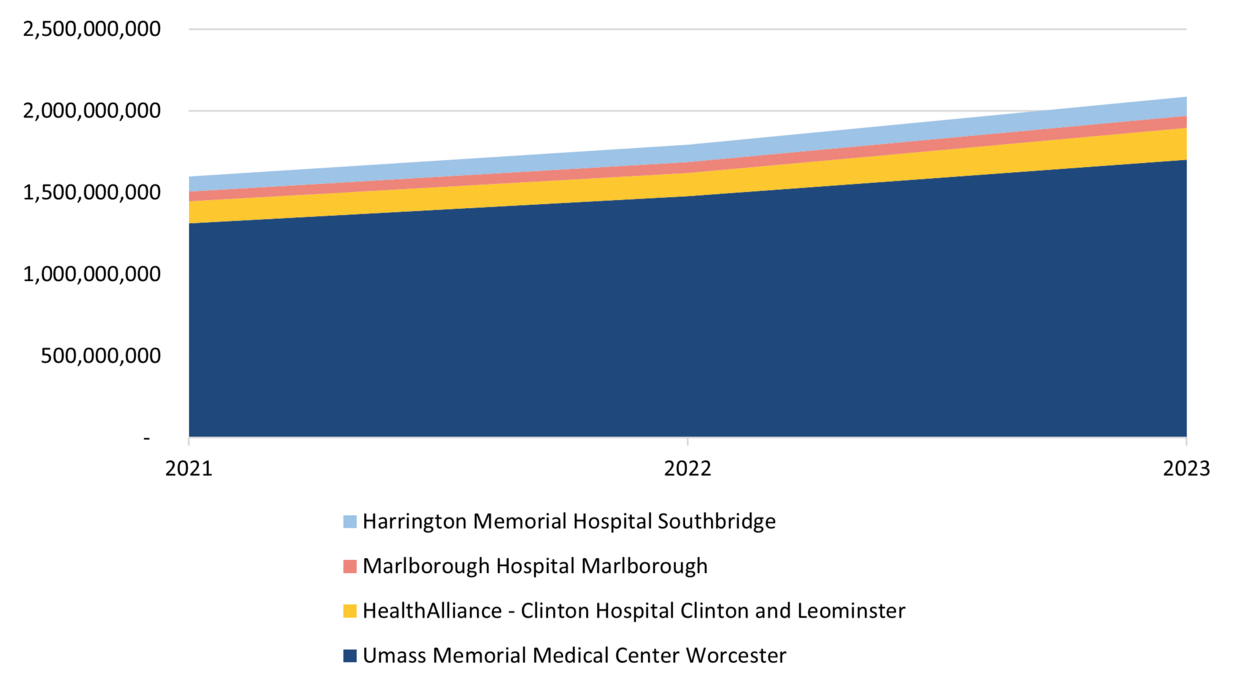Overview
Under Chapter 118E of the Massachusetts General Laws, the Executive Office of Health and Human Services (EOHHS), through the Division of Medical Assistance, administers the state’s Medicaid program, known as MassHealth. MassHealth provides access to healthcare for approximately 2.4 million eligible children, families, seniors, and people with disabilities, all of whom have low or moderate income. In fiscal year 2024, MassHealth paid healthcare providers more than $21.7 billion, of which approximately 37% was funded by the Commonwealth. Medicaid expenditures represented approximately 36% of the Commonwealth’s total fiscal year 2024 budget.
UMass Memorial Health (UMMH) is a private, nonprofit healthcare provider in Central Massachusetts and operates four hospitals in the region. During the audit period, July 1, 2020 through June 30, 2023, MassHealth paid $5.48 billion to UMMH for medical services provided at all four of its hospitals. The total Medicaid revenue received by UMMH increased during each year in the audit period, as detailed in the chart1 below.
Medicaid Revenue by Hospital
Health Equity at UMMH
UMMH’s Health Equity Strategy focuses on addressing and reducing health disparities, which are differences in health outcomes and/or access to healthcare caused by factors such as race, ethnicity, socioeconomic status, or geographic location that often result in disadvantaged groups experiencing poorer health than other populations. UMMH states on its website that it addresses health disparities by promoting fair access to healthcare for all individuals, regardless of their background or socioeconomic status. UMMH states that its Health Equity Strategy seeks to reduce structural barriers linked to poverty and racism by enhancing UMMH’s ability to identify patients with social needs and connecting them to necessary community resources and support for better health.
Maternity Care and Birth Reporting
During the audit period, UMMH operated maternity centers at UMass Memorial Medical Center in Worcester and HealthAlliance Clinton Hospital’s Leominster campus. These maternity centers offered services for expecting parents, including prenatal care and childbirth education, labor and delivery, and post-partum follow-up care for mothers and babies.
UMMH is required, under Section 305.020 of Title 105 of the Code of Massachusetts Regulations, to report all births occurring at its hospitals within 10 days of the birth to the Department of Public Health’s (DPH’s) Registry of Vital Records and Statistics. This process begins with parents and physicians completing a worksheet with a baby’s name, weight, and date and time of birth. UMMH’s birth registrar then reviews hospital birth logbooks to ensure that the parents of and physicians for each baby are provided with the worksheet and that each birth is accounted for. The worksheet is then processed by UMMH’s birth registrar and entered into the Vitals Information Partnership, an online portal for the registration of birth records in Massachusetts that is maintained by DPH. A paper copy of the worksheet is also faxed to DPH for its records. UMMH performs an annual reconciliation with DPH to ensure that all births have been reported.
UMMH reported a total of 14,784 births to the DPH between January 1, 2020 through December 31, 2022. The number of births, by year, at each hospital are detailed in the table below.
| Hospital | 2020 | 2021 | 2022 |
|---|---|---|---|
| HealthAlliance Clinton Hospital | 568 | 543 | 501 |
| UMass Memorial Medical Center | 4,142 | 4,437 | 4,593 |
| Total | 4,710 | 4,980 | 5,094* |
* DPH publishes birth data on a calendar year schedule, with its most recently available data being for calendar year 2022. As a result, some of the births included in this table are outside of the audit period. In addition, the table above does not include the last six months of the audit period (January through June 2023).
Public Assistance received by UMMH
UMMH received public grant funding for COVID-19 relief from a variety of state and federal sources, including the Massachusetts Emergency Management Agency (MEMA), with funds authorized by the Federal Emergency Management Agency; and EOHHS, with funds authorized by Chapter 102 of the Acts of 2021. The public assistance funds UMMH received from MEMA should be used for the purpose of responding to the COVID-19 pandemic. The COVID-19 funds UMMH received from EOHHS should be used for the following purposes, according to the Payment Agreement between UMMH and EOHHS:
i. Mitigating financial hardship due to declines in revenue or profits by supporting payroll costs and compensation of employees, returning to full staffing, or supporting operations and maintenance of existing hospital facilities;
ii. Obtaining technical assistance, counseling, and other services to assist with business planning needs;
iii. Implementing COVID-19 mitigation and infection prevention measures, such as vaccination or testing programs; or
iv. Mitigating fiscal strain due to lost profits experienced due to the COVID-19 pandemic and the increased costs of operations, workforce, supplies, and rendering hospital services resulting from the COVID-19 pandemic.
During the audit period, UMMH received a total of $99,886,925 in state and federal public assistance grants for the purpose of COVID-19 relief. The amount per fiscal year is detailed in the table below.
| Funding Category | 2021 | 2022 | 2023 |
|---|---|---|---|
| Federal COVID-19 Funding | $24,354,105 | $11,452,378 | $0 |
| State COVID-19 Funding | 0 | 25,571,593 | 38,508,849 |
| Total | $24,354,105 | $37,023,971 | $38,508,849* |
* Data for federal and state COVID-19 relief funding is from the Center for Health Information and Analysis’s Health System Performance Dashboard.
| Date published: | November 4, 2025 |
|---|
